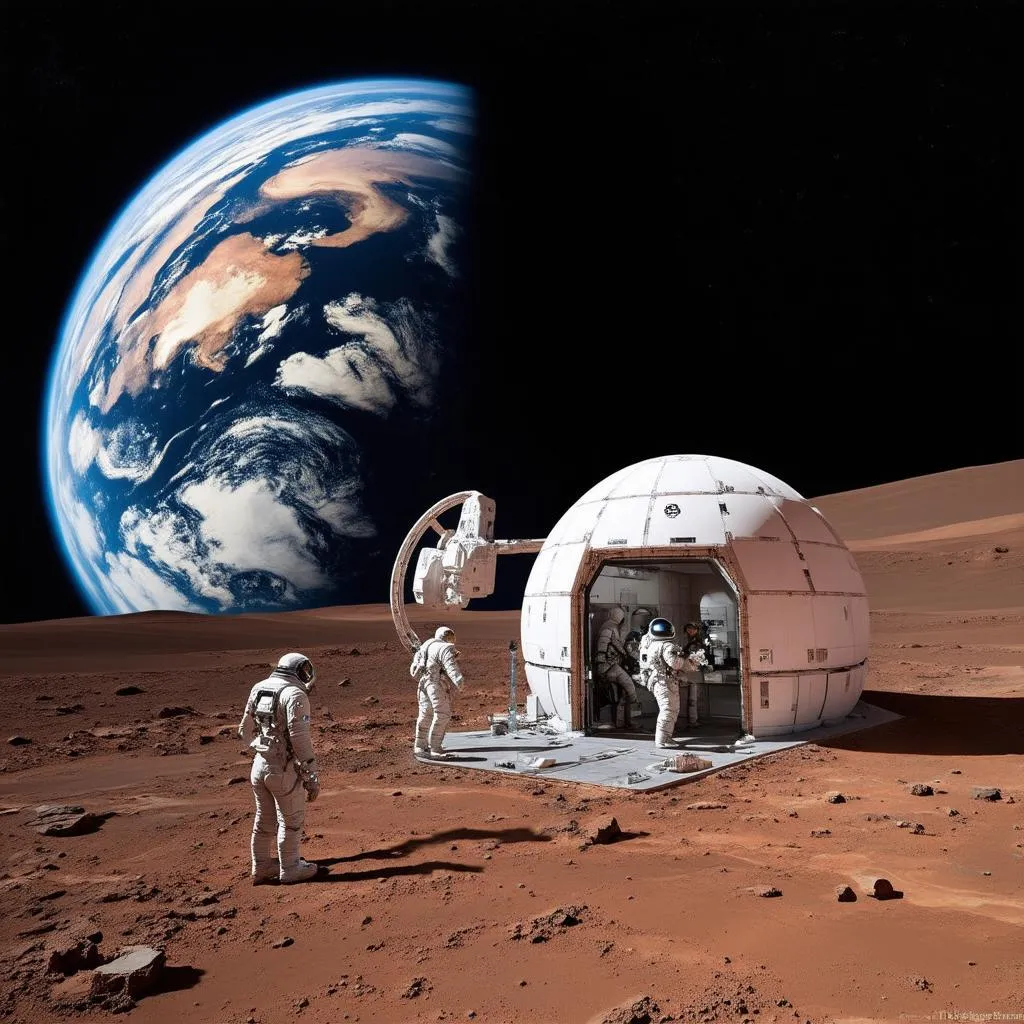“Two possibilities exist: either we are alone in the universe or we are not. Both are equally terrifying.” – Arthur C. Clarke. This quote perfectly encapsulates the human fascination with space exploration, especially the possibility of reaching Mars. But are astronauts really planning a trip to the Red Planet, or is it just the stuff of science fiction?
From Dreams to Reality: The Mission to Mars
While sending humans to Mars might seem like something out of “Star Trek,” it’s closer to reality than you might think. Several space agencies, including NASA and SpaceX, have ambitious plans to make this sci-fi dream a reality.
Why Mars?
The Red Planet has captivated us for centuries. But why Mars, when there are countless other celestial bodies?
- Similarities to Earth: Mars has a 24-hour day/night cycle and seasons, making it somewhat similar to our home planet.
- Potential for Life: Scientists believe Mars may have once harbored life, and evidence of water ice suggests it could potentially support future human colonies.
- The Next Frontier: Just as explorers crossed oceans and continents, reaching Mars represents the next giant leap for humanity.
The Challenges of Interplanetary Travel
Journeying to Mars isn’t like booking a flight to Paris. It’s a tremendously complex endeavor with numerous hurdles:
- Distance: The distance between Earth and Mars varies greatly depending on their orbits.
- Time: A one-way trip could take around seven months, meaning astronauts would be away from Earth for years.
- Radiation: Space is filled with harmful radiation that poses significant health risks.
- Psychological Effects: Confined spaces, isolation, and the stress of such a mission can take a toll on mental health.
The Timeline: When Can We Expect a Martian Landing?
While there’s no definitive date, most experts agree that a crewed mission to Mars could happen within the next two decades. NASA aims for the 2030s, while SpaceX, with its ambitious Starship program, might even achieve it sooner.
 Astronaut exploring the Martian surface.
Astronaut exploring the Martian surface.
Preparing for the Red Planet
Reaching Mars requires cutting-edge technology and rigorous astronaut training.
Building the Right Stuff
Imagine designing a vehicle capable of not only traveling millions of miles but also landing safely on another planet. That’s what engineers are doing! Spacecraft like SpaceX’s Starship are being developed with reusable technology, making space travel more sustainable and cost-effective.
Astronauts: The Ultimate Explorers
Astronauts undergo intense physical and psychological training. They live in simulated Martian environments, conduct research, and learn to work together in extreme conditions. Think of it as the ultimate team-building exercise, only with much higher stakes.
A New Home Among the Stars?
While the initial missions will focus on exploration and research, the ultimate goal for many is to establish a permanent human presence on Mars.
Terraforming: Turning Red to Green
Could we transform Mars into a second Earth? Terraforming, the hypothetical process of altering a planet’s environment to make it habitable, is a topic of much debate and speculation.
Ethical Considerations
As we venture further into space, it’s crucial to consider the ethical implications. How will our presence impact a potential Martian ecosystem? Who has the right to claim resources on another planet? These are questions that need to be addressed.
 A futuristic base on Mars, with Earth visible in the sky.
A futuristic base on Mars, with Earth visible in the sky.
Traveling to New Worlds, Discovering Ourselves
The quest to reach Mars is more than just a scientific endeavor; it’s a testament to the human spirit of exploration and our desire to push the boundaries of what’s possible. It’s about seeking answers to fundamental questions: Are we alone? What else is out there?
While the journey to Mars presents immense challenges, it also offers incredible opportunities. It’s a chance to learn more about ourselves, our place in the universe, and the potential for life beyond Earth.
If you’re interested in learning more about space exploration and the wonders of the universe, be sure to check out the fascinating articles on TRAVELCAR.edu.vn. After all, who knows, maybe one day we’ll be planning our own vacations to the Red Planet.
Frequently Asked Questions about Mars Exploration
Q: How long does it take to get to Mars?
A: The travel time to Mars varies depending on the positions of Earth and Mars in their orbits. On average, it takes about seven months for a one-way trip.
Q: What are the biggest challenges of sending humans to Mars?
A: Some of the biggest challenges include the long duration of the journey, exposure to radiation, the psychological effects of isolation, and developing the necessary technology for safe landing and return.
Q: What is terraforming?
A: Terraforming is the hypothetical process of modifying a planet’s atmosphere, temperature, and ecology to make it suitable for human life.
Q: What are the ethical considerations of colonizing Mars?
A: Ethical considerations include the potential impact on any existing Martian life, the allocation of resources, and the long-term governance of a Martian colony.

